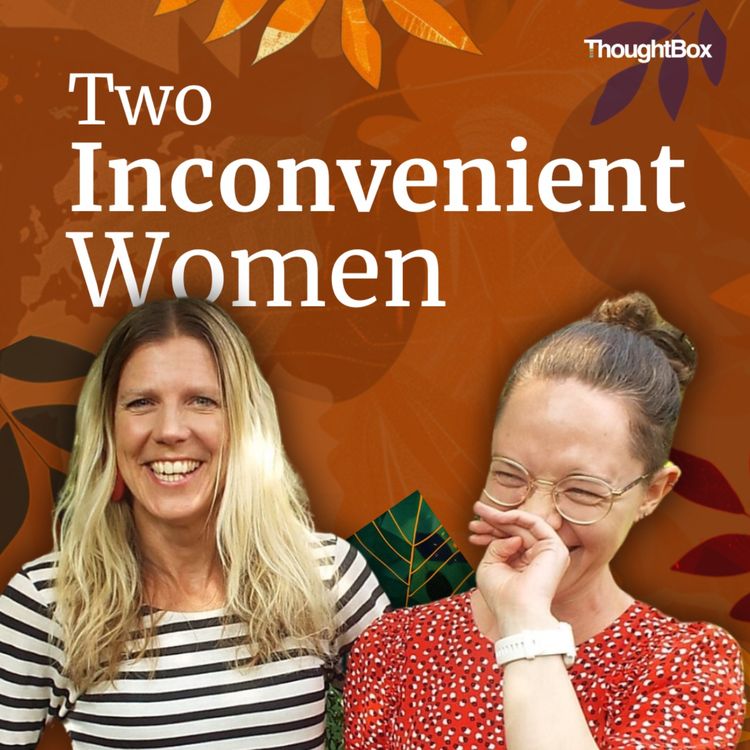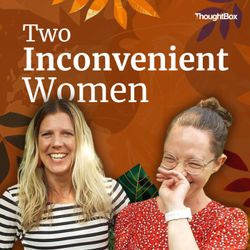Share

Two Inconvenient Women
SPECIAL EPISODE: Falling in love with the world
When we allow ourselves to fall in love with the world, everything changes. But sometimes we need someone to help us to fall in love in the first place...
This special episode is a dedication to the life, work, wisdom and utter brilliance of Dr Stephan Harding, a globally renowned ecologist, teacher, elder and truly beautiful soul who recently passed away. His work has had a profound influence on both of us and a significant influence on the work we do at ThoughtBox. We therefore wanted to give this episode to Stephan in order to share our appreciation and to reflect a little on some of the magic he weaved during his lifetime; in particular the infectious way he inspired hundreds of thousands of people to fall in love with the world.
Dr Stephan Harding | 8th July 1953 - 2nd September 2024
In this episode we reference the following:
- Wild Podcast - Why settling Mars is a really dumb idea - Kelly Weinersmith
- Why You Want a Physicist to Speak at Your Funeral, Aaron Freeman
- Cosmic Eye video
- The Deep Time Walk App
- Outrage & Optimism Podcast with Dr Stephan Harding
- How flowers talk to bees (David Attenborough)
- Wild Geese - Mary Oliver poem
More episodes
View all episodes

7. Throwback episode: the inconvenience of systems thinking
58:09||Season 5, Ep. 7Holly and Rachel are away this week, so we're re-sharing an episode from this time last year on the inconvenience of systems change.Systems thinking isn’t just a concept—it’s how life works. Every action, choice and relationship is part of something bigger. So why do we resist seeing the connections? In this episode, we explore what it really means to understand the world as an interconnected whole. It’s not about learning a framework, it’s about shifting how we see, think and act. This conversation explores what happens when we start noticing the patterns we’re part of—and begin to change them.
6. Why is singing so good for us?
51:30||Season 5, Ep. 6Singing is a deeply healing and cathartic experience for humans - mentally, emotionally, neurologically and spiritually. It is a primal quality we all possess, and something that has formed an innate and constant part of human culture since the dawn of our species. Singing is a birthright, yet many of us have been told that 'we can't sing'. We often mention singing on this podcast as both Holly and myself (Rachel) are members of our local choirs. Both of us have had very different routes into singing - and perhaps represent some of the different ways that singing has shaped - or absented itself - from our lives.In this week's episode we dive deeply into the many different ways that singing is good for us - from the way it makes us feel, to how it helps soothe our nervous systems, to how it helps forge our connection to others and the wider world. We explore some of the science of singing, the qualities of song in different cultures; the resonance of singing in harmony with others and dabble a little in the profound and extraordinary mystery and magic of where and how music shapes the entire universe.In this episode we reference the following:Wednesday Lunchtime Fun Choir (event / website)The Universal Frequency (website)How flowers talk to bees - David Attenborough (video)Harriet - biopic of Harriet Tubman (film trailer)Spirituals - protest, sacredness and song (website)
5. What does it mean to belong?
01:02:35||Season 5, Ep. 5Belonging is the innate human desire to be part of something larger than us. It is primal - something that we all yearn for constantly and can find in different places and spaces across our lives. So were are the places that we can find and really feel a sense of belonging? And what happens when belonging means a sacrifice of our authenticity? In this week's episode of Two Inconvenient Women, we explore what it means to belong, some of the places that we all can - and often do - find a sense of belonging; what it means to belong to ourselves and how this sense of inner belonging helps shape our authenticity in the world, allowing us to feel even more of a sense of connection.In this conversation we reference the following:Dr Dan Siegel - Interpersonal Neurobiology (website)Brene Browne - Atlas of the Heart (Book)Martin Shaw - The Woman who became a Fox (video)Dr Stephen Porges - Polyvagal Theory (website)Groups & Gangs - ThoughtBox Curriculum (website page)
4. Why are countries banning social media?
58:00||Season 5, Ep. 4There has been a lot emerging in the media recently about countries making decisions to ban social media for under 16s. Australia has been leading the way in this movement, with many other countries now passing legislation through government and widening the public discourse. So why social media? Why 16? Why now?In this week's podcast we begin to untangle many of the complexities that living in an online world is having on our mental, physical, emotional spiritual and social health, in particular how it is influencing the development of children and young people. Drawing wisdom from the depth research of social psychologists such as Jonathan Haidt (whose infamous book The Anxious Generation is waking up millions to the 'disconnection epidemic') we wrangle with some of the questions, complexities, possibilities and opportunities of shifting ourselves away from the trappings of an online world and 'rewiring ourselves' back into healthier connections.In this episode we reference the following:The Anxious Generation - Jonathan Haidt (book)The Social Dilemma - Exposure Labs (Film / documentary)No rush to ban social media - Sonia Livingstone (LSE article)How a handful of technology companies control billions of minds - Tristan Harris (TED talk)Is Social Media making us less social? ThoughtBox (inquiries for 5-18 year olds) **COMING SOONDigital Literacy - Ditch The Label (Lesson resources 13-16 years)**We will be releasing our full Learning for Life resources for free in mid-February- keep an eye on the ThoughtBox website for more details: www.thoughtboxeducation.com
3. What does it mean to 'winter'?
51:59||Season 5, Ep. 3Whilst many parts of the world experience a climate of winter, how many of us allow ourselves to 'winter' during this season? Or anytime? What does it mean to 'winter' - to follow nature's rhythms and allow things to slow down, to fall away, to be still, quiet. What does it mean to sit in the dark (literally and metaphorically) - how might this be allowing us to grow on a much deeper level? And what is happening in our cultures that prevents this? What does it mean to be living in a culture of 'perpetual summer' where slowness and quiet are not part of the status-quo?In this episode, we dive into the literal and metaphorical resonance of wintering; thinking about how the feeling in the atmosphere can give us clues for how to behave, discussing what some of the inner emotions around 'wintering' may bring up and exploring some of the different ways to tether more of our lives to living in balance with the rest of nature - from how we eat, sleep and act to simply being more in tune with our own needs and rhythms.We reference the following:Wintering - Katharine May (book)How Wintering Replenishes - On Being podcast with Katherine May (podcast)Reconnection Retreat - ThoughtBox (event)
2. Are we in a polycrisis and what can we do about it?
55:29||Season 5, Ep. 2When the world feels overwhelmingly complex, it is often hard to know where to put our energy; which 'crisis' to give our attention to as it were. You may have come across the term 'polycrisis' as it's fast becoming part of the public lexicon. It's not a particularly cheery term, but it is helpful in making sense of the many interconnected and overwhelming crises that we are facing in our lives. The polycrisis is characterised by feedback loops where one crisis exacerbates another, making simple, isolated solutions ineffective. Which is the greatest inconvenience we face when trying to address them. And yet diagnosing the crisis is the first step to addressing it - and this term is useful in doing just that. In this episode, we wrangle with the complexity of the times we're living in through the frame of the polycrisis; tapping into what we can appreciate from the framing of a 'metacrisis' at the same time, and how looking at changing our perspective on the world is a powerful way to focus on meeting the symptoms and addressing the root cause of a world in crisis. We reference the following during the conversation:Reconnection Retreat - ThoughtBox & Hawkwood College (in-person gathering)The Story of Triple WellBeing - Rachel Musson (free PDF)The Metacrisis is a crisis of meaning - Ernesto van Peborgh (article)Triple WellBeing Practitioner Course (online training course)Tasting the Pickle: Ten Flavours of Metacrisis and the Appetite for a New Civilisation - Jonathan Rowson (essay)
1. Is it really a new year? Is it really a new me?!
54:33||Season 5, Ep. 1For many in the world - those following the Gregorian calendar - January 1st marks the beginning of a new year. Midst the celebrations, revelry and resolutions is often an unspoken expectation of 'newness'. Pressures exist to have "resolutions" that make us somehow a better, fitter, happier, healthier version of ourself. But to what extent do we need this? To what extent do we want this? And to what extent is now the time for 'a fresh new world' anyway?In this week's episode of Two Inconvenient Women, we explore some of the different cultural celebrations for new year, thinking about how they map to the seasons, nature's rhythms or stories that other influences. We discuss the difference between having resolutions and intentions and how one can be a real support and guide, whilst the other can often feel like a burden or self-inflicted prison. We unpack some of the ways that new year has been coopted by a consumer culture fixated on 'bigger, better, shinier' and what this may be doing to our sense of ease. We think about what it means to be a 'new you' and whether a process of growth and becoming is a wiser step into a new year, rather than setting ourselves a goal to arrive at which has ever-moving goalposts.
18. A New Year's Gift: Poem for a New Year By Matt Goodfellow
02:25||Season 4, Ep. 18Poem for a New YearBy Matt GoodfellowSomething’s moving in,I hear the weather in the wind,sense the tension of a sheep-fieldand the pilgrimage of fins. Something’s not the same,I taste the sap and feel the grain,hear the rolling of the rowanringing, singing in a change.Something’s set to start,there’s meadow-music in the darkand the clouds that shroud the mountainslowly, softly start to part.
17. A Christmas Gift: Stories of Triple WellBeing
52:20||Season 4, Ep. 17We're taking a break over the holidays and are not recording a new episode of Two Inconvenient Women today. Instead, we're sharing a gift - a whole range of stories of inspiring people from across the world working to create a healthier future for people and planet. From educators in Uganda focused on self-care in leadership to teachers challenging the mainstream to communities focused on nature connection at the heart of learning, our Triple WellBeing Fellows are ordinary people with extraordinary stories.Dive into the whole community and begin your listening journey: https://thoughtboxeducation.com/stories